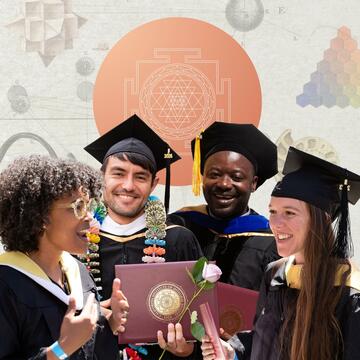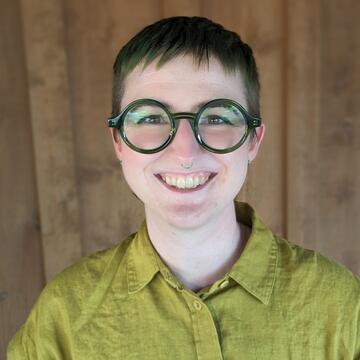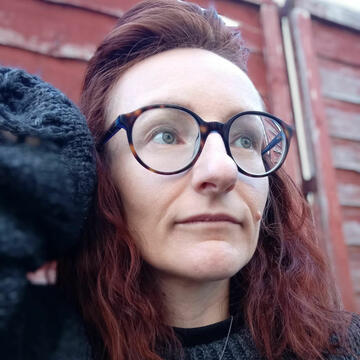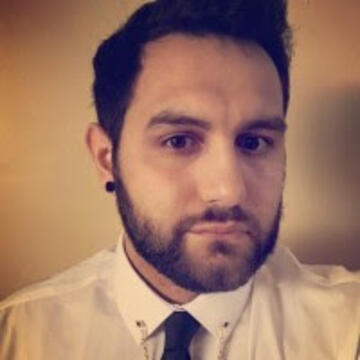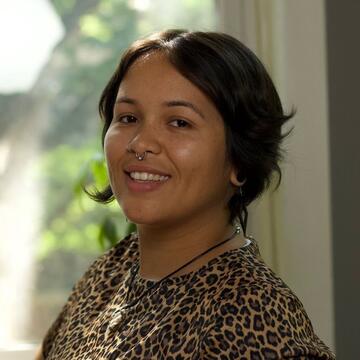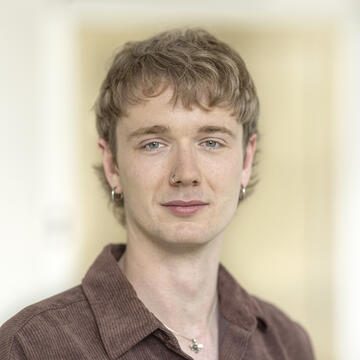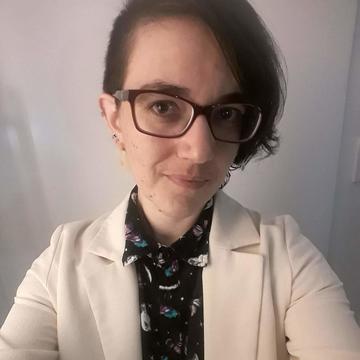
Lavender Languages Institute
The annual Lavender Languages Institute at the Human Sexuality Department offers 10 days of online class discussion, research opportunities and informal conversations exploring topics of current interest in language and sexuality studies, queer linguistics, and various lavender language themes. Please submit your application to hold your spot for our 2025 summer institute, which runs online from June 9-18.
Who Should Attend?
- Those just beginning language and sexuality studies
- Those preparing undergraduate or graduate research topics (including thesis or dissertation proposals)
- Those seeking a safe space to examine language/sexuality topics in depth
Course Offerings
-
Archie Crowley (Elon University, North Carolina)
What do you need to know about language and linguistics to study gender and sexuality? This course will provide an introduction to linguistics and language studies to prepare students to engage with research within Queer and Trans Linguistics and Lavender Language frameworks. We will address key concepts in phonetics, morphology and syntax, discourse analysis, and semiotics through research on language, gender, and sexuality.
-
Frazer Heritage (Manchester Metropolitan University, England)
In this course, you will learn how to analyse large collections of machine-readable texts. You will engage with freely accessible software to investigate discourses of gender and sexuality. You will learn the basic concepts associated with corpus linguistics and how these can be combined with more qualitative interpretations of data. This course will provide corpora that you might want to explore the representation of different gender and sexual identity within, but participants are also welcome to bring their own corpora to investigate. By the end of this course, you should feel more comfortable in using corpus software to investigate large, representative samples of naturally occurring data.
-
Dr. Hielke Vriesendorp (Utrecht University, the Netherlands)
While queer linguistic work tends to focus on case studies to investigate how norms around language, gender and sexuality are negotiated in context, this course explores how queer linguistic work can also be conducted with higher levels of generalizability. It explores the risks of generalizing queer data (essentializing, erasure, othering and discrimination) as well as the potential gains (expanded applicability, visibility and the use of data for the pursuing of policy goals and social change). Best practices are discussed by incorporating insights from intersectionality research, Bayesian approaches to probability and queer-centered methodological studies, as well as both qualitative and quantitative queer linguistic research.
-
Hann Bingham Brunner (Landmark College, Vermont)
What is Crip Linguistics, and how does it relate to Queer and Trans linguistics? In this course, we will begin by examining the relations between Queer theory and Crip theory to gain an understanding of the inter-relatedness of these fields. Then, we will enter the burgeoning realm of Critical Disability or Crip Linguistics to learn about the foundations of the discipline and what has been done thus far. Finally, students will have the opportunity to devise their own projects more fully integrating crip, queer, and trans linguistics.
-
David Peterson (University of Nebraska-Omaha, Nebraska)
This seminar offers participants the opportunity to explore the representations of gender-sexual normativity that buttress various types of white nationalist discourse, including ethno-statist (e.g, neo-fascism, Anglo-Saxonism, etc.), religious (e.g., Christian statism), and combinations of these both historical and in the present moment. While the focus will primarily be on US-based discourses, participants are invited to consider other relevant nationalist contexts. Particular attention will be paid to practice analysis using Critical Discourse Analysis and Systemic-Functional Linguistics to unpack nationalist texts and their anti-LGBTQ+ messages.
-
Ashvin R. Kini (Stonehill College, Massachusetts)
This course will engage convergences in queer studies, lavender languages and ethnic studies. Drawing on both foundational and recent queer and feminist scholarship in Black studies, Native and Indigenous studies, Latinx studies and Asian American studies, we will take an intersectional and relational approach to the study of race as a mode of difference and power. To this end, we will consider how scholars, artists and activists have conceptualized the intersections of multiple systems of domination, as well as imagined and forged new forms of language, political identity, community and culture in their struggles for more just futures.
-
Ariana Steele (Penn State University, Pennsylvania)
How do we subvert and resist systems of oppression and the limits of normativities, and what is the role of language and other systems of social meaning in resistance? This course first builds an understanding that gender and racial oppression emerge from iterative discourses in society, and, though widespread, are capable of resisting against. Then, with a focus on where sociolinguistic indexicality can point to or open up cracks in these systems, we will look at case studies such as Black women commenting on gentrification, trans and nonbinary resistance, alternative drag queens, and Latina gang members (to name a few), asking how marginalized people can leverage language and the body towards subversion and resistance.
-
William Leap (American University, Washington D.C.)
What does the history of language-and-sexuality look like when linguistic history is not described as a chronology, a sequenced trajectory, a linear movement toward some triumphant goal? In this course, we use queer method(s)-and-theory(s) to respond to this question. We identify evidence of non-compliant and transgressive genders and sexuality(s) in history as attested within linguistic data from “before.” More importantly, we consider how different types of linguistic data reveal different examples of transgressive sexuality(s) in history, each with their own consequences. Queer and trans inquiry(s) are not afraid of things that “are not made, and cannot be made, to signify monolithically” (Sedgwick 1990:8). But hetero-normative regulatory practices loose bits of authority and credibility each time queer and trans inquiry confirms gendered and sexual non-compliance and transgression. So we discuss ways to build queer and trans descriptions of language, sexuality and history that will promote historical and political challenges to gender/sexually monolithic social regimes.
* With apologies to Cindy Patton.
-
Prerequisite: Queer and Trans Semiotics I from a previous Summer Institute
Jeremy Calder (University of Colorado, Colorado)Semiotics is the study of signs, how they are used, and how they are interpreted. This course builds on the discussions of Queer and Trans Semiotics from the introductory course offered in previous summer institutes. The course will examine in closer detail how key topics and concepts in the study of semiotic theory (e.g., indexicality, iconicity, embodiment, agency) tie into the articulation of gender identity, especially for queer and trans subjects -- despite cisnormative discourses that threaten to position them as illegible?
-
Joanna Chojnicka (University of Groningen, The Netherlands)
This course delves into the complex relationship between language, queerness, and globalization. It explores how the global spread of English intersects with the commodification of queerness, whereby a sanitized, marketable – and, notably, “Western” – model of queerness passes as universal, and alternative local ways of being queer are overlooked, silenced, suppressed. Combining queer studies with postcolonial/decolonial linguistics and critical approaches to Global English research, it challenges the idea of English as the "queer lingua franca", the only language of queer liberation and global queer culture. Through engaging with multilingual and localized queer narratives, the course suggests a critical reading of global queer history and promotes the recognition of diverse queer experiences.
Class Schedule
(All times in Pacific Daylight Time)
Week 1
| Monday, June 9 - Friday, June 13, 2025 | |||
|---|---|---|---|
| Time | Group A | Group B | Group C |
| 6:00 AM - 7:15 AM | Introduction to Linguistics for Lavender Language Studies | Nationalisms, Genders & Sexualities | Queering Global English |
| 7:30 AM- 8:45 AM | Queer & Trans Semiotics | Generalizing in Queer Linguistics | Queer of Color Critique |
| 9:00 AM- 10:00 AM | Hour free for lunch and LLI social activities | ||
| 10:15 AM- 11:30 AM | Crip Linguistics | Analyzing Gender, Sexuality, and Queer Identity with Corpus Linguistic Methods: Big Data Meets Close Qualitative Reading | Race, Gender, and Resistance |
| Saturday, June 14, 2025 | |
|---|---|
| Time | |
| 6:00 AM- 1:00 PM | Language, Sexuality, History: “Tremble, heteronormative linguistic swine”* *Apologies to Cindy Patton |
Week 2
Monday, June 16 and Tuesday, June 17, 2025
Each class will have its own plan for the Monday and Tuesday time slot. Some classes will meet both days; some will use one or both days as work time. Check-in with your instructors for details.
Wednesday, June 18, 2025
Closing Session - everyone meets from 7:00 AM to 9:30 AM.
Where Do I Apply?
Prospective participants should fill out and submit the Summer 2025 Application Form.
For more information, email lavlanginstitute@ciis.edu.
What Are the Fees?
The total cost to participate is $350.
Program Alumni and Cohort Photos
-
Adrian Ray Avalani - The University of Chicago (2021)
Adrienne Percival - Compass Community Center (2021)
Aiden Loughlin - University of Victoria (2019)
Aine McAlinden - Georgetown University (2021)
Aisha Ramazanova - Higher School of Economics (2022)
Alex Bandong - Appalachian State University (2021)
Allen Michaela - University of St. Thomas (2021)
Andrea Bryant - Reed College (2021)
André Bernard - Hong Kong Baptist University (2022)
Archie Crowley - University of South Carolina (2018, 2019, 2021, 2022)
Artemis López Fuentes - Universidade de Vigo (2021)
Ashley Thornton - University of Brighton (2021)
Ayden Loughlin - University of Victoria (2021)
Brandon William Epstein - Bar-Ilan University (2022)
Brooke English - Rice University (2018)
Carlos Vazquez - State University of New York, Stony Brook (2019)
Chen Li-Chi - Faculty of Linguistics, Casimir the Great University (2021)
Claudia Holguin Mendoza (2021)
Corey Tatz - Memorial University of Newfoundland (2021)
Corey Thorne - Memorial University of Newfoundland (2018)
Damara Martin - Florida Atlantic University (2019)
Darren Brockes - The University of Chicago (2021)
Darrin Miller - University of North Texas (2018)
Derek Vaughn - Florida Atlantic University (2018)
Diana Davidson - University of Washington (2022)
Elizabeth Johnstone - New York University (2021)
Emerson Barrett - Oregon State University (2022)
Ernesto Cuba - City University of New York, The Graduate Center (2018)
Farieda Ilhami Zulaikha - Universitas Perjuangan Tasikmalaya (2021)
Guadalupe Ortega - Dartmouth College (2022)
Hanna Bruns - University of Bonn (2021)
Hannah Bingham Brunner - Oklahoma State University (2021, 2022)
Hannah Sawall - University of Duisburg-Essen (2022)
Hazel Marshall - Ucniveristy of California, Santa Barbara (2018)
Ian Funk - The George Washington University (2021)
J. Inscoe - University of Maryland Baltimore County (2021)
Jade Levandofsky - American University (2018)
Jamison Wezelis - SUNY, University at Buffalo (2021)
Jason D'Angelo - Georgetown University (2018, 2019)
Jennifer Bosco - University of San Fransisco (2022)
Jhonatan Henao-Muñoz - University of Arizona (2021)
Jimmy Lizama - Researcher at Rising Graduate Student (2021)
Joey Andrew Lucido Santos - Chulalongkorn University (2021)
Jordan Tudisco - University of California, Santa Barbara (2018, 2021)
Joseph Radice - University of Florida (2019)
Julissa Mansilla Bjalme - Florida Atlantic University (2019, 2021)
Kate Pashby - Independent (2021)
Kevin Rivera-Morales - University of Victoria (2019)
Lara Boyero Agudo - University of Oregon (2021)
Laura Horst - California Polytechnic State University - San Luis Obispo (2018, 2019)
Lex Konnelly - University of Toronto (2018, 2019, 2021, 2022)
Leyla Savloff - University of Washington, Seattle (2018)
Makayla Qionn - University of St. Thomas (2022)
Matias Sanhueza - University of Chile (2021)
Maximilliano Campana - independent scholar (2019)
Max Reuvers - University of Groningen (2022)
Melissa Curry - Rhode Island College (2018)
Michael Barnes - University of Birmingham (2021)
Michelle Marzullo - California Institute of Integral Studies (2018)
Mie Hiramoto - National University of Singapore (2019)
Mira Cantrick - California Institute of Integral Studies (2021)
Montreal Benesch - Reed College (2021, 2022)
Natascha Rohde - Aston University Birmingham, U.K. (2021)
Orion Wesson - University of Oregon (2021)
Patrick Sonnenberg - University of Tennessee, Knoxville (2018)
Peter D'Ettore - Broward College (2021)
Peyton Sibert - Florida Atlantic University (2022)
Ray Johns (2022)
Rebecca Andre - Palm Beach County Now (2021)
Remington LeBeau (2022)
Robin Hershkowitz - Bowling Green State University (2021)
Robin Turner - University of Illinois (2021)
Sahin Acikgoz - University of Michigan, Ann Arbor (2018)
Simon Charles Thériault - University of Montreal (2019)
Sydney Jameson-Blowers - University of Buffalo (2021)
Tahtzee Nico - University of Washington (2021)
Vagrant Gautam - Saarland University (2022)
Victoria Portela-Rosado - University of Victoria (2019)
Will Alvarez Navarrete - University of British Columbia (2021)
-
Image

2022 Lavender Language Cohort (not entire LLI group in picture) -
Image

2021 Lavender Language Cohort (not entire LLI group in picture) -
Image

2019 Lavender Language Cohort -
Image

Meet the Faculty
Lavender Languages Institute Teacher
Human Sexuality
School of Consciousness and Transformation
Lavender Languages Institute Teacher
Human Sexuality
School of Consciousness and Transformation
Lavender Languages Institute Teacher
Human Sexuality
School of Consciousness and Transformation
Lavender Languages Institute Teacher
Human Sexuality
School of Consciousness and Transformation
Lavender Languages Institute Teacher
Human Sexuality
School of Consciousness and Transformation
Lavender Languages Institute Teacher
Human Sexuality
School of Consciousness and Transformation
Lavender Languages Institute Founder and Head of Curriculum
Human Sexuality
School of Consciousness and Transformation
Lavender Languages Institute Teacher
Human Sexuality
School of Consciousness and Transformation
Lavender Languages Institute Teacher
Human Sexuality
School of Consciousness and Transformation
Lavender Languages Institute Teacher
Human Sexuality
School of Consciousness and Transformation
Meet the Institute
Lavender Languages Institute Founder and Head of Curriculum
Human Sexuality
School of Consciousness and Transformation
Lavender Languages Institute Director
Human Sexuality
School of Consciousness and Transformation
Lavender Languages Institute Digital Pedagogy Coordinator
Human Sexuality
School of Consciousness and Transformation
